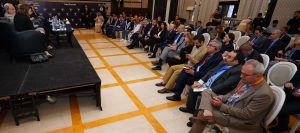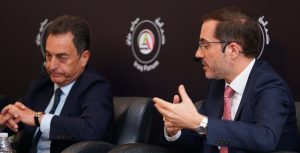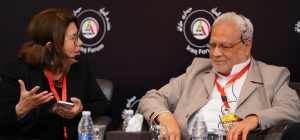(Private session, Conducted under Chatham House rules)
Participants of this private roundtable session included ambassadors, journalists, and foreign policy experts from Iraq, Iran, and major European countries. They delved into the details of Iraq’s international partnerships, and took a detailed, critical and nuanced look at the relationships and barriers to more even-handed relations. This session was conducted under Chatham House Rules, hence no statement here can or should be attributed to any of the participants.

Iraq has enjoyed significant international support throughout its many stages of development, most recently in the fight against ISIS and subsequent support for state development and capacity-building. The international partners have continued to offer assurances to help Iraq remain a sovereign state in the face of aggression, wherever it occurs. Relationship dynamics between countries must be bilateral to succeed, and this discussion therefore provided a space for honest and constructive reflections on the current barriers to progress and suggestions for improved relations, offering the audience an idea of what the international community expects from Iraq’s government, and where the opportunities may be.
Being frank about the struggles they encountered when dealing with the Iraqi state, including cumbersome bureaucracy and the dispersal and fragmentation of power, the participants also highlighted the opportunities and positive benefits they see from relations with Iraq. There was an all-round expression of hope to see this develop and strengthen. Participants also displayed an acknowledgement that US and other European focuses and influences in Iraq are shifting, but demonstrated their commitment to Iraq in other ways – including building upon economic relations, and supporting the country as it transitions away from unsustainable sources of energy. They suggested that a key to Iraq’s success would be via building stronger and more reliable institutions.

It was clear that there is a strong commitment from the European governments to the sovereignty and prosperity of Iraq, and that a strong Iraq is perceived to serve the European’s own interests too. The European partners have supported the Baghdad Conference(s) for Cooperation and Partnership, and believe that Iraq should regain its natural role in the region. Clearly, Iraq’s relationship with European countries has been changing and evolving, along with their mutual perceptions and expectations. However, many participants acknowledged that there is an opportunity to redefine the relationship. We are living in 2023, and no longer in 2013/2014 when ISIS first emerged (as stated by one of the participants). Hence, the military presence of the coalition partners has been downsized to minimum, while engagements are still evolving. Another shared policy priority is the economy, and most European countries wish to partner with Iraq, and work to promote the private sector and trade. Other shared challenges that affect them in Iraq are many, and include climate change and gas flaring.
On the challenges that internationals working in Iraq face over the execution of projects due to the overly bureaucratic nature of the state, foreign diplomats highlighted the lack of institutional continuity as a major issue. Each new government comes in with major initiatives but with hardly any institutional continuity. Some business leaders have gone as far as saying that it is difficult to do business in Iraq. The country needs a long-term, coherent vision, particularly to address some of the challenges, such as the economy, diversification, and climate change.
Attracting international investors and partners is partly about accelerating the processes of doing business, and providing transparency of the process. Procurement processes in Iraq are too long. There are companies that have been pursuing opportunities for up to seven years, and in some cases without clear results. International companies aren’t going to wait that long to find out if those opportunities are real and follow them through. Many international participants acknowledged that the Al-Sudani government has made progress, but the companies also need to be paid. Apparently, Iraq’s track record on paying its international contracts is not great. Better and faster international engagement requires clarity, greater transparency and honouring contracts, particularly regarding prompt payment.
Strategically, the Government of Iraq should try and ensure there’s unity of vision within its institutions on what now needs to happen. Iraq is not yet clear as to the vision it wants, and can no longer blame the US for the challenges it faces. Iraq needs help with technical support, and there are plenty of opportunities for other countries to get involved.

On Iran, the European participants believed that it is natural for Iraq to have strong relations with Iran and other countries. It is no secret that the relationship between Iran and Iraq has been characterised as a complicated one. The two countries have fought an eight-year bloody war against each other, but later fought together against ISIS. They have extensive social, political, and cultural ties and share many Shiite holy shrines. However, Iran’s hegemony over Iraq is evident and Iran’s leaders makes it clear that they want the American troops leave both Iraq and Syria. Some participants acknowledge that China has concentrated on the economic and commercial spaces, and the Iraqis have a choice where to turn to in these sectors based on fair competition and national interests.
Finally, on human rights, several participants emphasised that Iraq needs to do more for promote freedom of expression, women rights and other human rights, as per the universal values based on UN Declarations.
Iraq Forum: For Stability and Prosperity
2/05/2023
A Policy Workshop: International Partnership: Perceptions, Aspirations and Barriers

